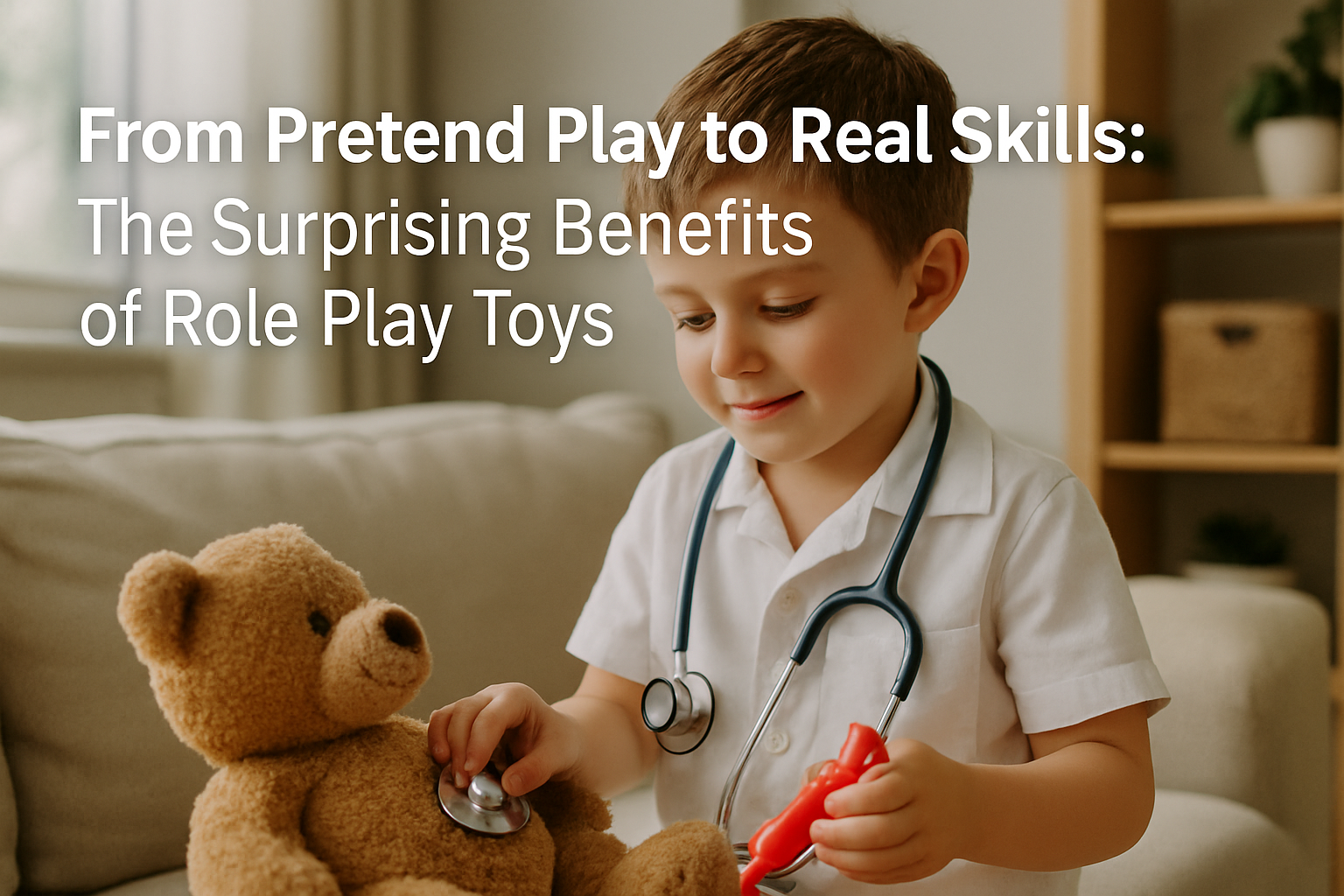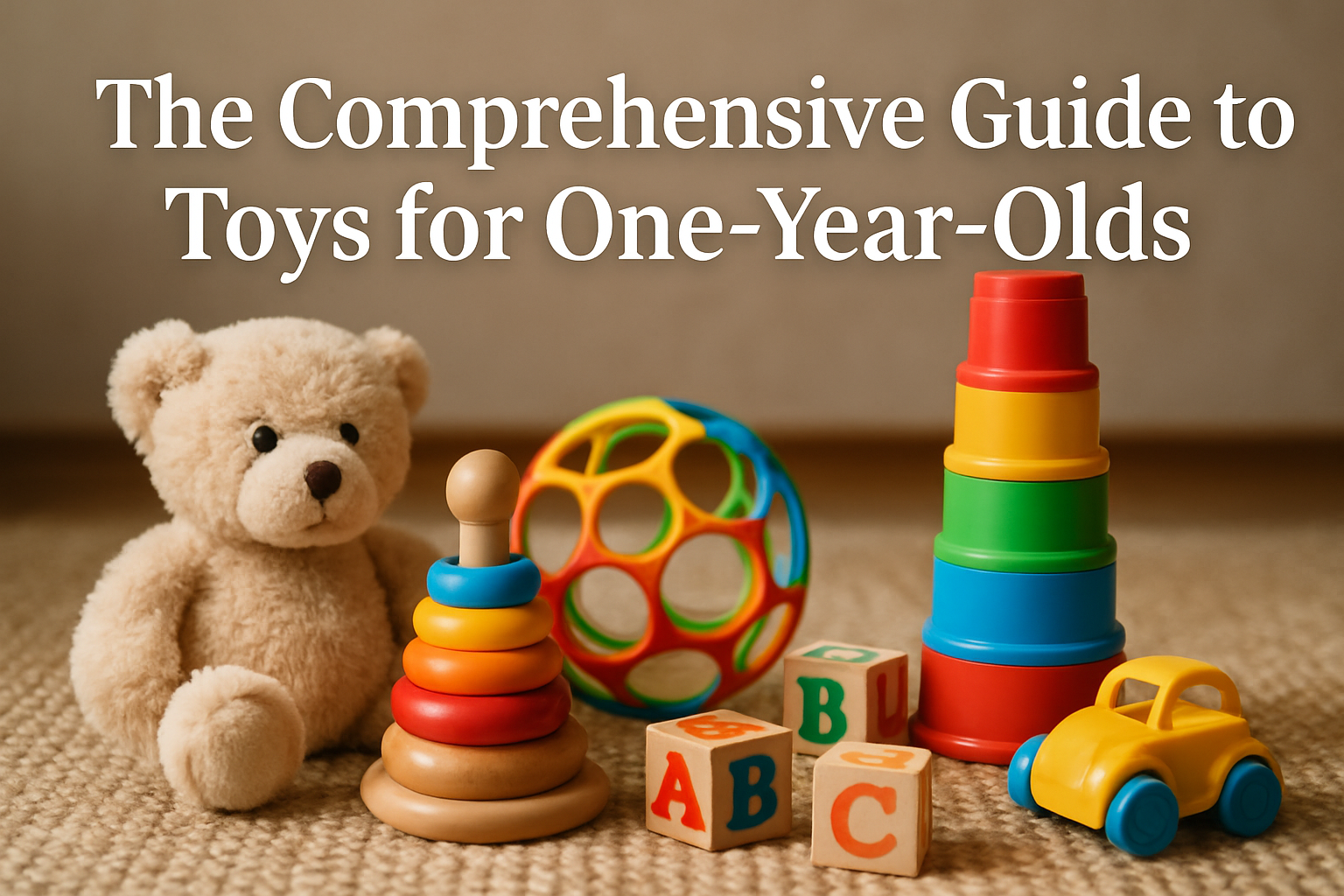The Comprehensive Guide to Toys for One-Year-Olds
Introduction to Role Play ToysRole play toys capture children's fascination b...

Add description, images, menus and links to your mega menu
A column with no settings can be used as a spacer
Link to your collections, sales and even external links
Add up to five columns
Add description, images, menus and links to your mega menu
A column with no settings can be used as a spacer
Link to your collections, sales and even external links
Add up to five columns

Role play toys capture children's fascination by allowing them to immerse themselves in imaginative scenarios. These toys serve as gateways for youngsters to explore various roles, whether it’s cooking in a miniature kitchen, playing doctor with a medical kit, or transforming into their favorite superheroes with costume accessories. Such experiences invigorate their creativity while providing them with a sense of agency that is both empowering and exhilarating. The enchanting world of role play toys promotes crucial learning techniques that enhance cognitive and emotional development.
The connection between play and learning is profound. Through pretend play, children initiate social interactions and hone problem-solving skills in a safe and anxiety-free environment. This style of play not only fosters creativity but also aids in the development of emotional intelligence. As children engage with these toys, they learn to negotiate, share, and even empathize with others, showcasing the integral role of imaginative play in their overall growth and education.
Role play toys encompass a wide range of products that encourage children to mimic real-world roles and situations. They can range from kitchen sets and doctor kits to firefighter gear and construction tools. Each type of toy serves a specific function in fostering a particular aspect of learning, giving children the freedom to explore various career paths and scenarios. The popularity of these toys stretches across various age groups, with even toddlers enjoying simpler versions while older children might enjoy more intricate setups. This versatility makes role play toys a favorite choice among parents and educators alike, as they address diverse developmental needs and interests, enhancing their learning journeys.
Role play toys unlock a world of imagination for children, allowing them to express their creativity in unique ways. When children engage in role play, they don’t just mimic real-life scenarios; they invent entire narratives, giving life to their ideas. This form of play stimulates their creative thinking. For example, while playing house or doctor, a child might create a storyline where they are a superhero tasked with saving the day. Such scenarios encourage them to think outside the box, leading to imaginative ideas that reflect their understanding of the world around them. The freedom to create these narratives not only enhances their ability to innovate but also builds a foundation for problem solving as they navigate through their invented scenarios.
Moreover, role play toys provide an environment where children can experiment with different roles and scenarios. This experimentation can range from being a chef running a restaurant to a teacher instructing students. As they take on various roles, they learn to communicate their thoughts and ideas clearly while interacting with their peers. This type of play becomes a rich ground for fostering creativity as children learn to improvise and adapt their stories based on feedback or interactions with others. The imagination sparked through such play can have long-lasting impacts on their creative capabilities, influencing how they approach problems later in life.
Furthermore, the development of social skills is significantly enhanced through role play. Children learn to share, cooperate, and communicate as they engage in structured play with peers. Collaborative play scenarios encourage them to work together toward common goals, such as building a fort or playing a game, which naturally leads to interactions requiring negotiation and compromise. These interactions are essential for mastering social norms, as children observe and practice social cues during these play sessions. Role play therefore serves not only as a creative outlet but also as a vital medium for social development, allowing children to practice and refine their social abilities in a supportive environment.
In addition to creativity and social skills, role play toys contribute to the improvement of children's problem-solving abilities. Engaging in role play often presents children with challenges that require innovative solutions. For example, when role playing as firefighters rescuing a stuffed animal from a pretend fire, children are tasked with devising a plan to save the toy. This process of strategizing boosts their critical thinking and allows them to explore various outcomes in a fun and low-pressure situation. They learn to assess risks, negotiate with friends about how to approach the problem, and come up with creative resolutions—all crucial components of effective problem-solving.
Another significant benefit of role play is its role in fostering emotional intelligence. Through immersive play experiences, children can express and manage their emotions in a safe space. For instance, when a child plays house, they might act out various family dynamics or address conflicts between characters. This not only allows them to explore their feelings but also helps them understand the feelings of others, enhancing their empathy. By stepping into different characters' shoes, children learn to recognize emotional cues and respond with compassion, skills that are vital for building healthy relationships as they grow.
The development of empathy through role play is reinforced when children interact with their peers during play sessions. As they confront dilemmas in imaginative scenarios, they engage in discussions about feelings and perspectives. This practice is essential for understanding social interactions and responding appropriately. It teaches children the importance of listening and valuing others' viewpoints, laying the groundwork for cooperative and considerate behavior in real-life situations. Overall, the benefits of role play toys stretch far beyond fun, significantly supporting children's emotional and social growth while honing their creativity and problem-solving skills.
In the realm of child development, role play holds a significant place in fostering creativity, social skills, and emotional intelligence among young children. Parenting experts emphasize that play is not just a pastime but a vital component of healthy childhood development. Various studies indicate that children learn best through engaged and active participation, and role play offers them the chance to experiment with different roles, understand social dynamics, and explore their environments safely. Experts highlight that through imaginative play, children gain a better understanding of their world, which can lead to improved cognitive and social outcomes.
Caregivers often perceive role play as a tool that encourages learning and development. Many parents and educators recognize its value in enhancing communication skills, empathy, and problem-solving abilities in children. For instance, when children engage in role play, they often mimic real-life situations, which allows them to process their feelings and interactions in a safe environment. Moreover, caregivers note that role play helps in building resilience, as children face challenges and negotiate roles, thereby developing conflict resolution skills. Through these activities, caregivers can observe their children's behaviors and provide guidance that nurtures their emotional and social development.
Transitioning to the global perspective on role play, it's clear that different cultures weave this practice into childhood experiences in unique ways. Various cultures incorporate role play into their educational frameworks, using it as a means to teach children about societal roles and values. For example, in some cultures, role play is explicitly tied to traditional beliefs and practices, enabling children to learn about their heritage while having fun. Additionally, specific roles or toys used in these activities provide insights into what each culture values, further emphasizing the importance of social learning through play.
A closer look reveals many culturally specific role play toys or practices. In certain societies, children might use simple puppets or dolls to recreate stories from folklore, allowing them to connect with their cultural narratives while developing their imagination. Other cultures may focus on outdoor role play, encouraging children to engage in community-based scenarios that highlight collaboration and mutual respect. These immersive experiences not only foster creativity but also instill a sense of identity in children, helping them to understand their place within their community and the broader world. Ultimately, role play serves as a universal language through which children can express themselves, regardless of cultural background.
Role play toys play a significant role in nurturing a child's development. These toys encourage imaginative play, prompting children to create stories and scenarios. Through enacting different roles, children can explore social roles and learn valuable social skills. This type of play allows kids to express their thoughts and feelings, which is essential for emotional development. Furthermore, as children experiment with serious adult roles, they develop an understanding of the world around them. Role play toys can enhance problem-solving skills, as they often necessitate critical thinking during play.
In addition to developing imagination, role play toys are vital for cognitive growth. As children engage in pretend play, they improve their language skills by expanding their vocabulary and learning new ways to communicate. They also gain a deeper understanding of cause and effect as they navigate different scenarios. Notably, role-playing helps in developing empathy. When children take on various roles, they learn to see things from different perspectives, enriching their emotional intelligence.
Lastly, role play toys bolster social skills by promoting interaction among peers. Children often play together, which encourages cooperation, negotiation, and taking turns. These interactions are foundational in building teamwork skills that will benefit them throughout their lives. The various benefits of role play toys contribute significantly to a child's overall development, laying a strong foundation for future learning and social interaction.
To enrich playtime experiences, parents and caregivers should consider incorporating more role play activities into their children's daily routines. Encouraging imaginative play can provide diverse benefits that enhance a child's social, emotional, and cognitive development. Parents can plan specific play sessions where they guide children in acting out different roles or scenarios. Setting up designated areas for role play, such as a small kitchen or a pretend shop, can also make playtime more engaging and immersive.
Selecting appropriate role play toys is essential to match children's interests and developmental stages. Parents should look for toys that reflect realistic scenarios, such as doctor kits, kitchen sets, or construction tools. These types of toys can stimulate children's imagination while allowing them to mimic real-life situations. Additionally, choosing toys that allow for open-ended play is beneficial. Unlike toys with specific functions, open-ended options encourage creativity and invention, giving children the freedom to create their worlds.
Ultimately, it is vital for parents and caregivers to participate in their children's role play activities. Engaging with children in these scenarios not only strengthens the parent-child bond but also enhances learning during play. By exploring new roles together, caregivers can introduce new vocabulary, concepts, and social norms organically. This involvement can lead to deeper discussions about emotions and relationships, making play a valuable educational tool.

Introduction to Role Play ToysRole play toys capture children's fascination b...

Introduction to Role Play ToysRole play toys capture children's fascination b...
Sign up for updates, sneak peeks and a coupon for 10% OFF your first order!